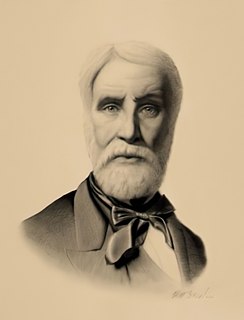A Quote by Donald Livingston
... the modern state masks itself in moral ideologies which obscure its actual conduct. One of the most compelling and insidious of these ideologies is the doctrine of natural rights. It was to secure these rights that the modern state was invented in the first place, and it is impossible, especially for Americans, not to be seduced by the doctrine. But it is nonetheless a philosophical superstition.
Related Quotes
Is it our task to force the biblical doctrine of God to answer to modern culture, or (is it our task) to address modern culture with the biblical doctrine of God? If modern culture-or any culture-establishes the baseline for the doctrine of God, such a doctrine will certainly bear little resemblance to the God of the Bible.
Western civilization has been at war with tribalism for 3,000 years. And that war was brought to the New World by the English colonists. A very early point in American law Chief Justice John Marshall is asked to decide the status of Indian tribes. And what he does. He calls them savages who lack the same rights as the white people who came over here, the Europeans, and colonized their land under this, what many Americans might regard as an obscure legal doctrine called the Doctrine of Discovery. But it is still the most important doctrine in American constitutional law.
The State, on the other hand, both in its genesis and by its primary intention, is purely anti-social. It is not based on the idea of natural rights, but on the idea that the individual has no rights except those that the State may provisionally grant him. It has always made justice costly and difficult of access, and has invariably held itself above justice and common morality whenever it could advantage itself by so doing.
Ultimately, the court is heading to a doctrine of 'separation of campaign and state.' This doctrine, like separation of church and state or separation of military and civilian authority, is not explicit in the Constitution but flows naturally from its structure and commitment to freedom and democracy.
Paul Davies takes us on a logically and rhetorically compelling modern search for human agency. This outstanding analysis, well informed by naturalistic views of our evolved affective nature, is the kind of philosophical work that is essential for a field to move forward when ever-increasing findings from modern science are inconsistent with traditional philosophical arguments. This book is for all who wish to immerse themselves in the modern search for free will. It is steeped in the rich liqueur of current scientific and philosophical perspectives and delusions.
[Before the Civil Rights Act of 1964], many governments in southern states forced people to segregate by race. Civil rights advocates fought to repeal these state laws, but failed. So they appealed to the federal government, which responded with the Civil Rights Act of 1964. But this federal law didn't simply repeal state laws compelling segregation. It also prohibited voluntary segregation. What had been mandatory became forbidden. Neither before nor after the Civil Rights Act were people free to make their own decisions about who they associated with.
In speaking to you men of the greatest city of the West, men of the state which gave to the country Lincoln and Grant, men who preeminently and distinctly embody all that is most American in the American character, I wish to preach not the doctrine of ignoble ease, but the doctrine of the strenuous life.


































